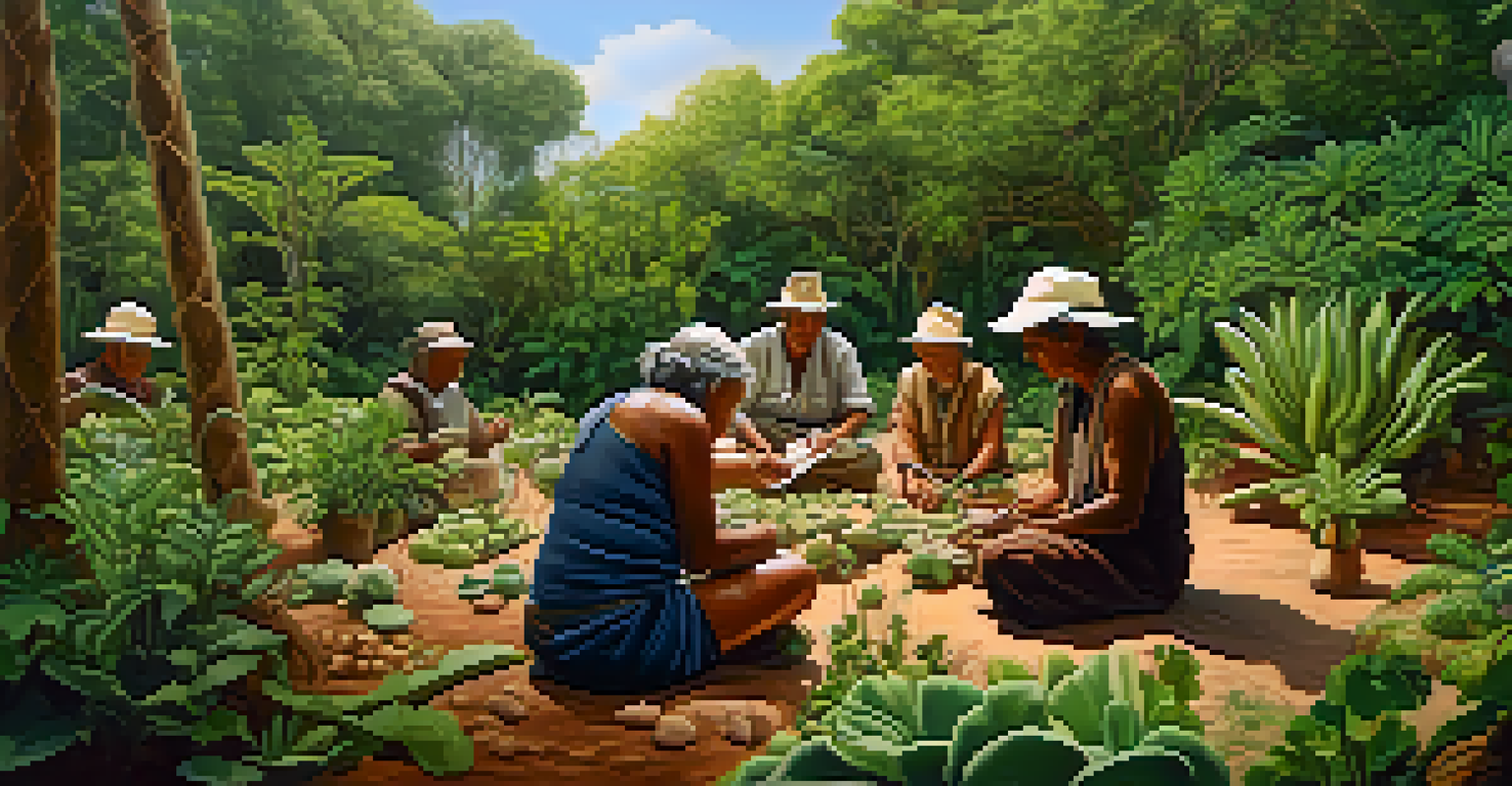The Ethical Implications of Peyote Harvesting Practices

Understanding Peyote and Its Cultural Significance
Peyote, a small cactus native to Mexico and the southwestern United States, has been used for thousands of years in Native American spiritual practices. This sacred plant contains mescaline, a psychoactive compound that induces profound spiritual experiences. For many Indigenous communities, peyote is not just a plant; it symbolizes a vital connection to their culture and traditions.
The plant is not just a part of our culture; it is our culture.
The cultural significance of peyote cannot be overstated. It's often used in ceremonial contexts, where its consumption is believed to facilitate communication with the spiritual world. This deep-rooted connection raises questions about the ethical implications of harvesting this plant, especially as demand grows outside traditional contexts.
As the modern world becomes increasingly aware of peyote’s psychoactive properties, understanding its cultural relevance is crucial. Recognizing and respecting these traditions helps frame the conversation around ethical harvesting practices and the potential exploitation of Indigenous knowledge.
The Impact of Commercialization on Peyote Populations
Commercialization of peyote poses significant risks to its natural populations. With a rise in interest from non-Indigenous users, peyote is being harvested at unsustainable rates. This not only threatens the plant’s survival but also undermines the cultural practices of Indigenous peoples who have historically used it responsibly.

As demand surges, many are drawn to the potential profits from selling peyote. Unfortunately, this often leads to overharvesting and environmental degradation. The delicate ecosystems where peyote grows can take years, if not decades, to recover from such exploitation.
Cultural Significance of Peyote
Peyote serves as a vital connection to Indigenous culture and spirituality, which must be respected amid growing interest.
The challenge lies in balancing the needs of those who wish to use peyote for personal or spiritual reasons with the necessity of preserving this important plant. Sustainable harvesting practices must be prioritized to ensure that future generations can also engage with peyote in meaningful ways.
Ethical Considerations for Harvesting Peyote
When discussing the ethics of peyote harvesting, it’s essential to consider who has the right to harvest and use the plant. Many Indigenous communities advocate for their exclusive rights to peyote, arguing that only those with a cultural connection should be permitted to harvest it. This raises questions about ownership and respect for Indigenous rights.
To respect Indigenous rights is to respect the land and the plants that sustain us.
There is also a pressing concern regarding the methods of harvesting. Ethical practices involve not only sustainable harvesting but also respecting the spiritual significance of the plant. The need for guidelines that prioritize both ecological health and cultural integrity is clearer than ever.
Navigating these ethical waters requires a collaborative approach, involving Indigenous voices, conservationists, and policy-makers. By working together, it’s possible to create a framework that honors the cultural significance of peyote while ensuring its survival in the wild.
Legal Framework Surrounding Peyote Usage
The legal landscape of peyote use is complex and varies significantly between regions. In the United States, peyote is classified as a Schedule I controlled substance, making it illegal for non-Native people to use or possess it. However, exceptions exist for members of federally recognized tribes who use it for religious purposes.
This legal distinction highlights the ongoing struggle for Indigenous rights and the recognition of their cultural practices. Many advocates argue that the law should provide greater protections for both the plant and the communities that rely on it. Meanwhile, discussions around legalization for broader use often overlook these critical cultural considerations.
Risks of Commercialization
The rise in non-Indigenous demand for peyote threatens sustainable harvesting and undermines traditional practices.
Navigating these legalities requires a careful balance between protecting Indigenous practices and addressing the growing interest in peyote among non-Native users. Lawmakers must consider the implications of their decisions on both the plant's sustainability and the rights of Indigenous peoples.
Sustainable Harvesting Practices for Peyote
To ensure the long-term viability of peyote, sustainable harvesting practices are essential. This includes implementing guidelines that dictate how much can be harvested and ensuring that the plant’s natural habitat is protected. Sustainable practices not only benefit the plant but also the ecosystems that rely on it.
One approach to sustainable harvesting is to encourage the cultivation of peyote in controlled environments. By growing peyote in gardens or farms, the pressure on wild populations can be alleviated. This method also allows for better monitoring of the harvesting process and ensures that the plant is treated with the respect it deserves.
Education plays a crucial role in promoting sustainable practices. By raising awareness about the importance of ethical harvesting, we can foster a culture of respect for peyote and its significance. Collaborative efforts between Indigenous communities and conservationists can also lead to innovative solutions that protect both the plant and its cultural heritage.
The Role of Indigenous Voices in Peyote Discussions
Indigenous voices are vital in discussions about peyote harvesting and use. Their perspectives provide invaluable insights into sustainable practices and the cultural significance of the plant. Engaging with these communities ensures that their rights and traditions are respected in any conversation surrounding peyote.
Many Indigenous leaders advocate for the preservation of their cultural practices and the protection of peyote habitats. Their knowledge of the land and the plant itself can guide ethical harvesting practices that honor both tradition and sustainability. This collaboration can lead to more effective conservation strategies.
Need for Ethical Harvesting
Establishing guidelines that honor Indigenous rights and promote sustainable harvesting is essential for the future of peyote.
Listening to Indigenous voices not only enriches the dialogue around peyote but also empowers communities to reclaim their rights. Promoting their narratives is essential in fostering a deeper understanding of the ethical implications surrounding peyote harvesting and usage.
Future Directions for Ethical Peyote Practices
Looking ahead, establishing ethical practices around peyote harvesting will require ongoing dialogue and collaboration. There is a growing recognition of the importance of integrating Indigenous knowledge with scientific research to create sustainable practices. This partnership can help address the challenges posed by commercialization and environmental degradation.
Additionally, promoting awareness about peyote’s cultural significance can help foster respect for both the plant and the Indigenous communities who have historically cared for it. Educational initiatives can empower individuals to make informed choices about peyote use and advocate for ethical practices.

Ultimately, the future of peyote depends on our collective commitment to ethical stewardship. By prioritizing sustainability and respecting Indigenous rights, we can create a framework that not only protects the plant but also honors the rich cultural heritage associated with it.